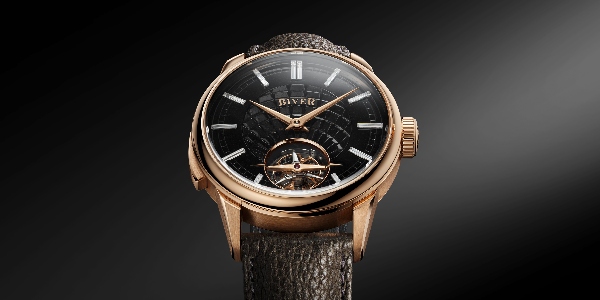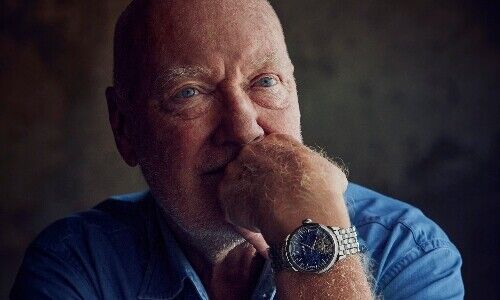Among watchmaking entrepreneurs, Jean-Claude Biver is one of the greatest. In the early 1980s, he was involved in the purchase of the brand rights for the no longer producing Blancpain. Biver brought it back on track; in 1991, Blancpain was sold to the Swatch Group for 60 million Swiss francs. Later, Biver left his mark, among others, at Hublot, where as CEO from 2004 to 2012, he multiplied revenues. Two years ago, he founded his own ultra-exklusive brand, Biver Watches. On the sidelines of the Watches & Wonders watch fair, finews.com meets the entrepreneur at the Hotel des Berges, where he receives customers and journalists for a whole week: agile and energetic as ever.
Mr. Biver, we are talking at the beautiful Hotel des Berges, where you rented a suite for the whole week, rather than at the big Watches & Wonders fair. Why?
Because we are not big. I'm 50 years in the business but my own business is now 20 months old. Which is even not two years. If I would have the envy to be part of Watches & Wonders, they would have told me: You have to wait two years, in 2025, we might have space for you. But I cannot wait. While waiting, I want also to grow.
What about next year? Will we see your new brand, Biver Watches, at the fair?
I'm hesitating because suddenly I realize that it's great being in a hotel: I am in the fair without being in the fair. I have all the advantages of the fair but not the disadvantages plus there is another atmosphere. We can eat with customers. Tonight we have some of them coming to watch football. So it is a certain ambiance. It's a more intimate setting.
But you are in discussions?
Yes, they told me that I could have an opportunity to join Watchers & Wonders next year. I met the people of course. I have also my personal very good relations as Jean-Fred Dufour, the boss of Rolex, is my best friend. Let's see. I think it's nice to be a little bit apart. Plus, we have produced 10 watches last year and this year we foresee to produce 18, maybe 20. The production is very small.
Is that volume in line with your expectations?
The expectation for last year was 14. We did only 10. The expectation for this year is 20. And already now I told you 18. This means I am not sure that we will reach 20. That's on purpose because I want to reach all the level of quality which limits the production. I want to produce something that you cannot produce. For instance the reverse of a dial is never worked. Our's is. (Biver shows the intricately decorated back of the dial of his Carillon Tourbillon.)
How many hours does this decoration take?
I cannot quantify that because we are working with natural materials. With stones, there is an issue with fibrosity. In the time it takes to make one perfect, you have to include the six or so that you broke before. So it's very variable and with Mother of Pearl or Obsidian gemstone, you can have one piece that works well and one piece that doesn't.
«Yesterday's nice weather, today rain: That's the rule of handmade»
The same is true for the movement components, the screws or steel components, levers, racks or else. Sometimes we get from the supplier a batch of steel that is perfect to decorate and sometimes we get it from another supplier and the steel takes more time. So in fact we're working really with the natural elements: Yesterday's nice weather, today rain. That's the rule of handmade.
With such an ultra small production: Do you have to work with a lot of different suppliers?
Not necessarily. The base of the movement is not made by us, although we have a strong and heavy participation in the design. Our engineer works together with the engineer of Dubois Dépraz. The fact is that it's not industrialized. We can work piece by piece at the speed we want, more or less.
Which part of the production is carried out in-house, which part by your suppliers?
All the decoration, all the polishing, is 100% made by us. The concept how to construct the movement is made by us and by the supplier, and then the raw material is made by the supplier. In the end, the product is 65-70% our responsibility and 30-35% responsibility of the supplier.
Biver Watches so far has launched one model, the ultra-exclusive that retails above 500'000 Francs. For whom did you design it? What kind of customer did you have in mind?
It was mainly for myself, which is very egoistic and restricting, but my concept is very personal. I want to put my hope into the watches. I want to put my style into the watches.
Who designs your watches?
My son, he's called Pierre Biver, and myself. We want to give the family approach, the family ambiance, the family soul to the watch.

First model: Biver Carillon Tourbillon with minute repeater. (Image: courtesy)
So, I assume, you also provide your customers with the cheese from your own farm?
My cheese is for my customer. As I said before, the customer is my king. I thought I would not have a boss anymore because it's my company, but I still have the customer as my boss. And, talking about my cheese: It's Etivaz, not Gruyere!
«The milk can only be heated with wood fire»
It is made like the Gruyere, with the restriction that the cows cannot eat grass under 1000 meters of altitude. Number two, the milk can only be heated with wood fire, not with gas or whatever. And that fire must be above 1000 meters as well. All this makes this cheese, although it's the same method as Gruyere, a little bit special
Are you able to sell your watch to clients from your previous jobs in the watch industry?
Not so many. Why? Because at Blancpain, at Omega, Hublot, Tag Heuer and Zenith, which are the brands for which I worked, we always had customers that are called retailers. We never knew the individual who bought a watch. We knew the watch is sold, but nobody gave us the name and the address of the customer, because the customer belongs to Bucherer or to Beyer or to Gübelin.
However, you traveled to a lot of countries, you visited the retailers, you did also events with the retailers, so you must have an idea.
We have an idea, but basically we had very few names and addresses of final customers. It's only now that we are discovering them. For me, it's a new start. I was never used to invite so many end customers. And now we work, as tonight, we watch football with the end customer. So it's a change. It's another business model.
How has your life changed? You were CEO of many watch brands, of the whole LVMH watch division in the end. Those are positions where you are not in control of your agenda. Certainly, you can leave your marks. But you are not a free person in some way...
... and now I am again not a free person. Because my boss is the customer. Now nobody is in between. I'm directly with the customer.
Do you enjoy the direct contact?
Yes, I enjoy that. When you deal with the end consumer, you are with the reality. If you deal with somebody that represents the customer, it's different.
In Zurich, if I go to Bucherer or Beyer and ask about a Biver watch, they won't have it. But will they give you a call?
If they are good, they will call me and they will say to the customer: Listen, as we have a very good contact with Mr. Biver, we want you to meet him privately. Give us a date and we make an appointment so you can discuss with him. If you have a special request for a special color of dial, you can ask him. And the customer will be pleased.
What else has changed in your life?
I give management lessons at different universities. Last week, as every year, I should have gone to Harvard Business School. And I go to Zurich University, I go to ETH, to St, Gallen. And I always say to the students: You must not forget that you will always have a boss. If you have no actual boss, your boss is the customer.
The Swiss watches industry and the Swiss financial industry are two of the main export sectors...
... and the pharmaceuticals.
Which are less romantic.
You mentioned finance, which isn't romantic either.
Well, at least it allows you to buy beautiful watches...
Very true.
How do you see the financial sector and the watch industry working together in terms of attracting clients to Switzerland, of making Switzerland known in the world?
In two weeks from now, UBS invited me to participate in a Swiss tour for their customers from all over the world. They will be making a stop where I can explain the watch industry. I am always willing to do this. I'm ready to make a speech. I'm ready to meet your people. I'm ready to have a dinner. I'm ready to have lunch. With this, your customers could become one day my customers.
«UBS invited me to participate in a Swiss tour for their customers from all over the world»
Both the watches and financial industriy are capitalizing on the promise of Swiss quality...
Quality and the honesty. We have to add honesty which is also a quality and which was a Swiss quality. It was a little bit forgotten but it is coming back: honesty and authenticity.
Many brands come to Geneva in order to announce novelties. What is your big novelty?
It will come out at the end of this year with the same look. But the movement will not be a minute repeater. It will be time only: hour, minute, second. However, we will start to show it in September. And at the end of this year, we will have to movements.
What else can you tell us about the new watch?
The existing minute repeater movement is the most complicated of our collection. The new hour, minute, second movement will be the most simple, but with the same level of decoration. The screws must be polished the same, the dial reverse polished the same, etc.
What will be the price point?
It will retail slightly under 100'000 Francs, because the number of hours involved in the work is much lower.
How is your planning from there?
Then, we will have a third movement, a fourth, a fifth and we think that by 2030 we will have four movements or five that will build our collection.
Jean-Claude Biver, born in 1949 in Luxemburg, is a legend of Swiss watchmaking. After graduation at HEC Lausanne, he discovered the Vallée de Joux and its industrial tradition. He met Georges Golay, then chairman of Audemars Piguet, who hired Biver as sales manager for Europe. In 1981, along Jacques Piguet, Biver purchased the rights to de defunct brand Blancpain, and resumed production. 11 years later, they sold Blancpain to Swatch Group for 60 million Swiss Francs. Later in his career, Jean-Claude Biver led Omega (also part of the Swatch Group), and later engineered stellar growth at Hublot. With the acquisition of Hublot by LVMH in 2008, he joining the watches devision of the luxury conglomerate, whose president he was from 2014 until 2018. Jean-Claude Biver founded his own brand, Biver Watches, together with his son Pierre Biver in 2022.































